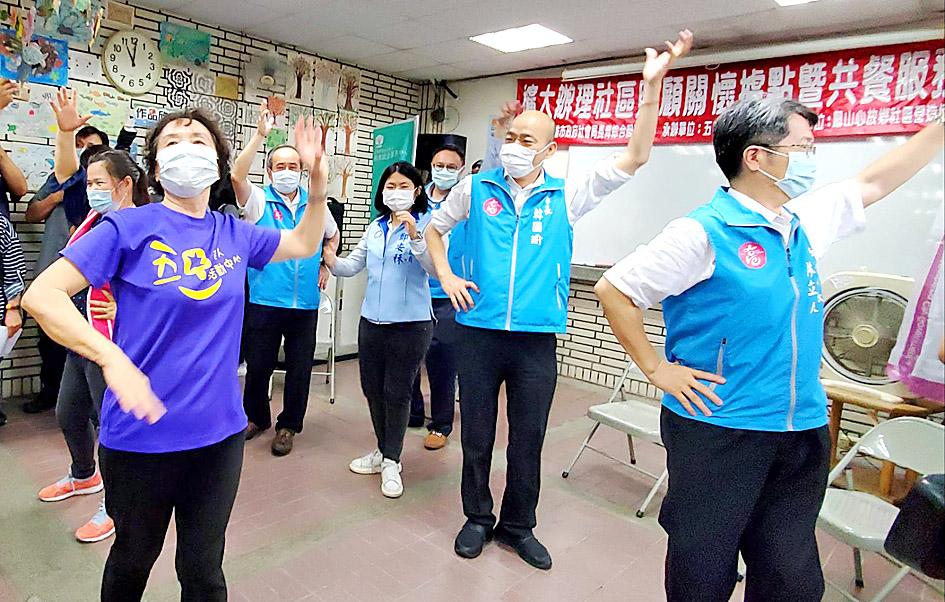Prosecutors on Wednesday initiated an investigation of Kaohsiung Civil Affairs Bureau Director-General Tsao Huan-jung (曹桓榮) for allegedly telling supporters of Kaohsiung Mayor Han Kuo-yu (韓國瑜) to interfere with a recall vote against Han, while pan-green politicians denounced the mayor and his team for devising ways to obstruct voting.
After receiving complaints from residents, the Kaohsiung District Prosecutors’ Office launched its probe of Tsao for alleged breaches of the Civil Servants Election and Recall Act (公職人員選舉罷免法).
Complainants provided evidence that Tsao on Saturday last week wrote on messaging app Line that Han supporters should not vote in the June 6 recall vote, saying: “We shall not vote, but we must monitor polling stations to put pressure on people voting to recall Han,” the office said.

Photo: Chen Wen-chan, Taipei Times
Tsao, a former head of the youth wing of the Chinese Nationalist Party’s (KMT) Kaohsiung branch, allegedly wrote the message one day after Han in a video posted on Facebook urged people not to “engage in any political activities” on the day of the vote and “those outside of Kaohsiung should not travel to the city.”
Pundits have said that Han and his team are attempting to reduce voter turnout, as votes in favor of recalling him need to exceed 25 percent, or 575,091 ballots, of eligible voters in the city for the motion to pass.
Democratic Progressive Party (DPP) Legislator (王定宇) said that the suggestion to “monitor voting” by Han’s administration and KMT officials is aimed at identifying who attends so they can divide people into “us” and “them,” which would lead some people to fear retribution.
“It is not right to put pressure on citizens exercising their right to vote,” Wang said. “It is an intimidation tactic, and the best way to fight such ‘dirty tricks’ by the KMT and Han’s team is for Kaohsiung residents to come out en masse and cast ‘yes’ votes.”
Taipei City Councilor Wang Shih-chien (王世堅) and other DPP officials have warned that other tactics are being deployed, following reports that members of Han’s camp last week attended a banquet in Taipei for talks with China Unification Promotion Party Chairman Chang An-le (張安樂) and members of the Bamboo Union crime syndicate.
Plans were made at the banquet for gang members and Han supporters to obstruct the recall vote by lining up at polling stations, where they would try to delay and disrupt the process, sources said.
Some of the tactics include filming the proceedings outside of the polling stations to intimidate voters, as well as having older people and gang members in line move slowly and cause delays, such as by not presenting their identification when at the head of the line, to prolong the process, with the aim of making people give up on voting on what is expected to be a hot day, the sources said.
Several DPP figures denounced the purported plan, saying that Han’s political career would be finished if a judicial investigation finds that he collaborated with gangsters to disrupt voting.
They urged Kaohsiung residents to not give in to intimidation, and to wear masks and hats while voting.

An essay competition jointly organized by a local writing society and a publisher affiliated with the Chinese Communist Party (CCP) might have contravened the Act Governing Relations Between the People of the Taiwan Area and the Mainland Area (臺灣地區與大陸地區人民關係條例), the Mainland Affairs Council (MAC) said on Thursday. “In this case, the partner organization is clearly an agency under the CCP’s Fujian Provincial Committee,” MAC Deputy Minister and spokesperson Liang Wen-chieh (梁文傑) said at a news briefing in Taipei. “It also involves bringing Taiwanese students to China with all-expenses-paid arrangements to attend award ceremonies and camps,” Liang said. Those two “characteristics” are typically sufficient

A magnitude 5.9 earthquake that struck about 33km off the coast of Hualien City was the "main shock" in a series of quakes in the area, with aftershocks expected over the next three days, the Central Weather Administration (CWA) said yesterday. Prior to the magnitude 5.9 quake shaking most of Taiwan at 6:53pm yesterday, six other earthquakes stronger than a magnitude of 4, starting with a magnitude 5.5 quake at 6:09pm, occurred in the area. CWA Seismological Center Director Wu Chien-fu (吳健富) confirmed that the quakes were all part of the same series and that the magnitude 5.5 temblor was

The brilliant blue waters, thick foliage and bucolic atmosphere on this seemingly idyllic archipelago deep in the Pacific Ocean belie the key role it now plays in a titanic geopolitical struggle. Palau is again on the front line as China, and the US and its allies prepare their forces in an intensifying contest for control over the Asia-Pacific region. The democratic nation of just 17,000 people hosts US-controlled airstrips and soon-to-be-completed radar installations that the US military describes as “critical” to monitoring vast swathes of water and airspace. It is also a key piece of the second island chain, a string of

The Central Weather Administration has issued a heat alert for southeastern Taiwan, warning of temperatures as high as 36°C today, while alerting some coastal areas of strong winds later in the day. Kaohsiung’s Neimen District (內門) and Pingtung County’s Neipu Township (內埔) are under an orange heat alert, which warns of temperatures as high as 36°C for three consecutive days, the CWA said, citing southwest winds. The heat would also extend to Tainan’s Nansi (楠西) and Yujing (玉井) districts, as well as Pingtung’s Gaoshu (高樹), Yanpu (鹽埔) and Majia (瑪家) townships, it said, forecasting highs of up to 36°C in those areas